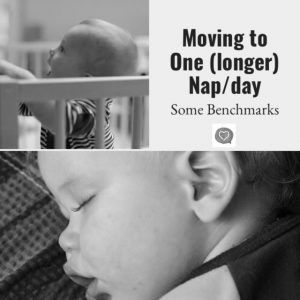Moving to One Nap A Day…Some Benchmarks
posted in: Babywise, Preparation for Parenting, Sleep Training, Toddlers & Preschoolers
0
Nap transitions with babies are one of those areas that requires observation and careful evaluation. Below are some of the things that were going on with our little ones that helped us determine when to move to one nap per day.
- One of the two daily naps didn’t produce much sleep
Two 2-hour naps are the norm among Babywise/Prep for Parenting babies starting at about the 9-10 month mark: one nap in the morning and one in the afternoon. When you are nearing this nap transition, it could be either the morning or the afternoon nap that becomes shorter and/or doesn’t seem to produce much sleep. The child who previously took good naps will either play in his crib during his nap period or perhaps cry or fuss to get Mom or Dad’s attention. When the transition to one nap is getting near, many times Babywise/PFP babies will be awake playing, singing, or otherwise self-entertaining in the crib for the duration of the nap time with little to no sleep. Recognizing that this is happening regularly could be a signal that perhaps one longer nap will work just fine.
- Sleep at bedtime takes awhile
Obviously it can happen occasionally that it takes longer than usual for your little one to fall asleep at bedtime. When this happens as a general rule though, you want to evaluate if the child is getting too much daytime sleep or if that second nap of the day is happening too close to bedtime. When you move to one nap, that nap will take place around mid-day … usually immediately after an early lunch. The length of the one nap will now be 2-3 hours, and sometimes even longer. (It’s heart-wrenching to wake a sleeping child, and if your little one is sleeping soundly, he obviously needs the sleep.) So if baby is still sleeping soundly at 3 hrs., it’s okay to let him sleep longer as long as that doesn’t have a negative effect on his nighttime sleep.
- With only one nap, your child has a pleasant day
On occasion when you happen to miss one of your little one’s naps, and the day still goes well, with little to no fussing or signs of being over-tired, it’s possible your little one might be getting close to moving to one nap per day.
Remember to be sure you are truly seeing signs that it’s time to move to one nap before you make the move, otherwise you might end up with a fussy baby everyday. Babies/toddlers are learning and discovering new things very rapidly and their little minds sometimes have a hard time settling to sleep, even though they really need it. If that’s the case, your little one will still take two naps well for at least a few days out of the week. When you notice that more consistently your little one plays through a nap (i.e. 5 or more days/week), it’s likely time to begin the transition to one nap.
Make the move slowly, as opposed to all at once. My babies stayed with two naps until they were 15-18 months old; the time varied per child. Evaluate the above signs for 2-3 weeks. Observing your child’s patterns will give you the appropriate guidance to know whether you should move to one nap or stick with two for a few more months.
Karen Kurtz is a mom of 4 Babywise/Prep for Parenting babies. All of them slept through the night as prescribed in the Ezzo’s parenting books. As a Contact Mom, Karen enjoys helping other parents train their babies and children. Karen and her husband, Don, make their home in NE Ohio and all four babies are now young adults.




